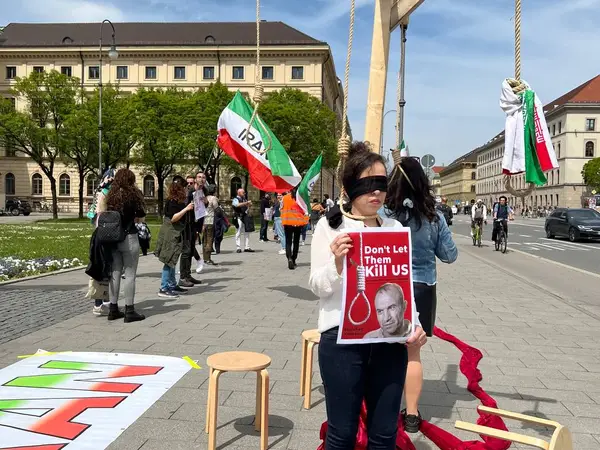Iranians at home and abroad staged protests Saturday against the Islamic Republic execution spree, the latest victims of which were three people hanged Friday.
The gathering of protesters started in Australia and New Zealand and continued until Saturday evening in dozens of other cities in Sweden, Denmark, Germany, Norway, Finland, Holland, Austria, among many others. Cities in the western parts of the US and Canada were the last where people held rallies.
Iranians are outraged and frustrated over the hangings; frustrated that protest gatherings outside the prison where they were held failed to halt the executions and outraged that calls by the international community did not stop the Islamic Republic's execution machine.
During rallies in Norway, Masud Gharahkhani, the Iranian born politician who heads the Norwegian parliament, sent a video message to protesters in the Swedish city of Gothenburg, saying, "In Iran, young people are imprisoned and executed, journalists do not have freedom and security, and the country's oil money is not spent for the people, but wasted on corruption.”
Alireza Akhondi, Swedish-Iranian member of the Swedish parliament, told Iran International during the rallies that the gathering of expatriates around the globe in the past few months prompted several resolutions in Western against the Islamic Republic.
The rallies were planned before the regime hanged Majid Kazemi, Saeed Yaghoubi and Saleh Mirhashemi Friday morning over trumped up charges after extracting forced confessions, in a case described as a travesty of justice. Human rights campaigners say they were tortured into confessions, and there was no reliable evidence against them.
They were convicted over the death of two IRGC’s Basij militia members and a police officer during protests in November last year, in what Persian media have dubbed the ‘Esfahan (Isfahan) House’ case. The three had been arrested in an Esfahan (Isfahan) neighborhood called “Esfahan House,” thus the name of the case.
Leaked audio from police radio chatter from the night the three regime agents were killed indicates that they were killed by friendly fire of plainclothes forces. The victims had even alibis for the time the agents were killed, with the family of one of the victims saying there is CCTV video footage of their son at work.
In reaction to the “grossly unfair trial that bore no resemblance to meaningful judicial proceedings,” Diana Eltahawy, Amnesty International’s Deputy Director for the Middle East and North Africa, said on Saturday, “These executions are designed by the Iranian authorities to send a strong message to the world and the people of Iran that they will stop at nothing to crush and punish dissent. In the absence of a robust international response, the authorities will continue to revel, unabated, in their impunity with lethal consequences for people in Iran.”
“Governments must urgently denounce these executions, in the strongest possible terms, through public statements and demarches. However, in the face of the Iranian authorities’ unrelenting use of the death penalty, this is not enough. People in Iran don’t have the luxury of time – they are being arbitrarily deprived of their lives at a horrific rate under the guise of judicial executions,” she said, urging all states “to exercise universal jurisdiction over all Iranian officials against whom there is sufficient admissible evidence of criminal responsibility for torture and other crimes under international law.”
Several neighborhoods in the capital Tehran and in Esfahan as well in a few other cities were scenes of protests against the regime’s executions. Students at universities across Iran also staged demonstrations.
Three more prisoners were executed for drug-related offences on Saturday as protesting families were shot at and tear-gassed outside the jail.
Friday's executions brought to at least seven the number of protesters hanged since the beginning of the nationwide protests last September, which turned into one of the boldest challenges to the clerical rulers since the 1979 revolution. The protests were ignited by Mahsa Amini's death in the custody of Iran's morality police.
